
The Moody Blues were an English rock band formed in Birmingham in May 1964. The band initially consisted of Graeme Edge (drums), Denny Laine (guitar/vocals), Mike Pinder (keyboards/vocals), Ray Thomas (multi-instrumentalist/vocals), and Clint Warwick (bass/vocals). Originally part of the British beat and R&B scene of the early–mid 1960s, the band came to prominence with the UK No. 1 and US Top 10 single "Go Now" in late 1964/early 1965. Laine and Warwick both left the band in 1966, with Edge, Pinder and Thomas recruiting new members Justin Hayward (guitar/vocals) and John Lodge (bass/vocals). They embraced the psychedelic rock movement of the late 1960s, with their second album, 1967's Days of Future Passed, being a fusion of rock with classical music that established the band as pioneers in the development of art rock and progressive rock. It has been described as a "landmark" and "one of the first successful concept albums".

On the Threshold of a Dream is the fourth album by the Moody Blues, released in April 1969 on the Deram label. The album reached the top of the album charts, the group's first No. 1 album in the UK. According to guitarist Justin Hayward, "I think Threshold is the defining album for the Moody Blues. And it's the one in the '60's that you would find in people's homes when you went, they would have that album."

David Justin Hayward is an English musician. He was the guitarist and frontman of the rock band the Moody Blues from 1966 until that group's dissolution in 2018. He became the group's principal vocalist and its most prolific songwriter over the 1967–1974 period, and composed several international hit singles for the band.
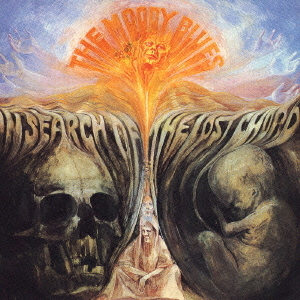
In Search of the Lost Chord is the third album by the Moody Blues, released in July 1968 on the Deram label.
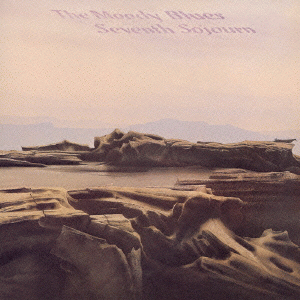
Seventh Sojourn is the eighth album by the Moody Blues, released in October 1972. The album reached No. 5 in the United Kingdom, and became the band's first American chart-topper, spending five weeks at No. 1 there to close out 1972.
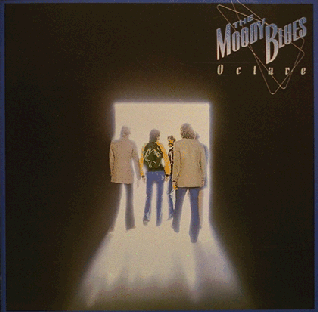
Octave is the ninth album by the Moody Blues, released in 1978, and their first release after a substantial hiatus following the success of the best-selling Seventh Sojourn in 1972. Released after a considerable break, which saw The Moody Blues returning in an era of punk music and disco, Octave produced a reduced commercial outcome for the band, but reached No. 6 in the United Kingdom and went platinum in the United States, where the album reached No. 13. The album produced the hit single "Steppin' in a Slide Zone", which hit No. 39 in the US, in addition to "Driftwood". The album's title is a musical pun: it references both the notion of an octave; and as a word derived from the Latin octavus it refers to this being the eighth album by this line-up of the Moody Blues.

"Nights in White Satin" is a song by the Moody Blues, written and composed by Justin Hayward. It was first featured as the segment "The Night" on the album Days of Future Passed. When first released as a single in 1967, it reached number 19 on the UK Singles Chart and number 103 in the United States in 1968. It was the first significant chart entry by the band since "Go Now" and its recent lineup change, in which Denny Laine and Clint Warwick had resigned and both Hayward and John Lodge had joined.
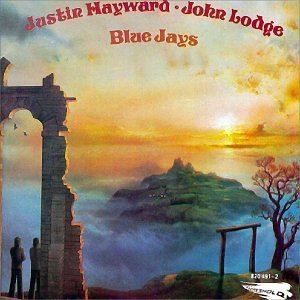
Blue Jays is a 1975 album by Justin Hayward and John Lodge. It was recorded and released during the Moody Blues' five-year hiatus.

Graeme Charles Edge was an English musician, songwriter and poet, best known as the co-founder and drummer of the rock band the Moody Blues. In addition to his work with the Moody Blues, Edge worked as the bandleader of his own outfit, the Graeme Edge Band. He contributed his talents to a variety of other projects throughout his career. In 2018, Edge was inducted into the Rock and Roll Hall of Fame as a member of the Moody Blues.

Caught Live + 5 is a live album by The Moody Blues, consisting of a 12 December 1969 live show at the Royal Albert Hall and five previously unreleased studio recordings from 1967 to 1968.

Moving Mountains is a 1985 solo album by Justin Hayward of The Moody Blues, released on Towerbell Records. It was later re-released on CD and cassette in June 1989 with one bonus track, "The Lights Are Low".

Time Traveller is a box set by British rock band The Moody Blues, released in 1994.

This Is The Moody Blues is a two LP compilation album by the Moody Blues, released in late 1974 while the band was on a self-imposed sabbatical. Though all of the songs were previously released on albums, several of them are heard here in distinctly different mixes. Like the Moody Blues albums of the time – but unlike most compilation albums, including later Moody Blues compilations – the songs on this album segue seamlessly, without silence between tracks. On the original LP, this was true of the songs on each side; when the album was remastered for CD, each disc was also blended, so that "Legend of a Mind" segues into "In the Beginning", and "Watching and Waiting" segues into "I'm Just a Singer ".
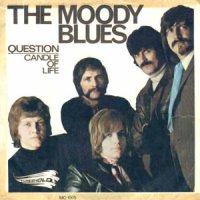
"Question" is a 1970 single by the English progressive rock band the Moody Blues. It was written by guitarist Justin Hayward, who provides lead vocals. "Question" was first released as a single in April 1970 and remains their second highest-charting song in the UK, reaching number two and staying on the chart for 12 weeks. The song reached number 21 on the Billboard Top 40 in the USA. It was later featured as the lead track on the 1970 album A Question of Balance. The single also features the song "Candle of Life" on its B-side, which was from the Moody Blues' previous album To Our Children's Children's Children.
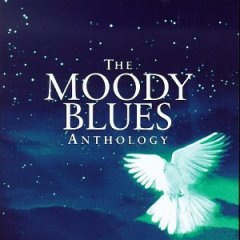
Anthology is a compilation album by the progressive rock band the Moody Blues. It was released in the US on 20 October 1998. It was not released in the UK until 2001 under the title The Collection with different artwork but with the same tracks as the US release.

Greatest Hits is a compilation album by the progressive rock band the Moody Blues, released in 1989. The band recorded new versions of "Isn't Life Strange" and "Question" with orchestration by the London Symphony Orchestra. The arrangements were overseen by Anne Dudley, who also produced the recordings with Justin Hayward and John Lodge. In 1990, only a year after its original release, the album was re-released as Legend of a Band: The Story of the Moody Blues with different artwork to coincide with the release of the home video documentary of the same name.
"Forever Autumn" is a song written by Jeff Wayne, Gary Osborne and Paul Vigrass, and sung by Justin Hayward. The original melody was written by Wayne in 1969 as a jingle for a Lego commercial. Vigrass and Osborne, the performers of the original jingle, added lyrics to the song and recorded it for inclusion on their 1972 album Queues. Their interpretation was also released as a single and gained moderate commercial success in Japan, selling more than 100,000 copies and becoming a top-20 hit on the country's record chart.

Justin Hayward and Friends Sing the Moody Blues Classic Hits is an album by Justin Hayward of The Moody Blues with the Frankfurt Rock Orchestra and Michael Sadler of Saga and Shaun Williamson as guest-singers. It's an album of tracks taken from the Moody Blues discography, played with orchestral arrangements with lead vocal duties being taken in turn by Hayward, Sadler, and Williamson.

Voices in the Sky: The Best of The Moody Blues is a greatest hits compilation for The Moody Blues, released in 1984.
"A Simple Game" is a 1968 song by the progressive rock band the Moody Blues. Written and sung by Mike Pinder, it was released as a non-album B-side to "Ride My See-Saw", a track from the album In Search of the Lost Chord. The song was produced by Tony Clarke and arranged by Arthur Greenslade. The track was included in the band's 1974 compilation, This Is The Moody Blues, remixed and with an earlier fade than on the single. It was also included, with its original mix and length, in the 1987 compilation Prelude.


















